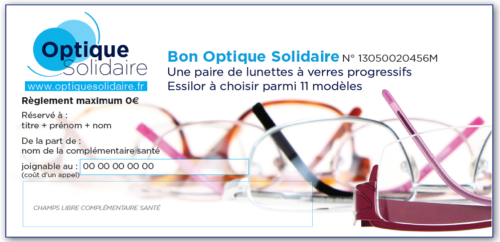
In short
The challenge
In France, 8 million people live below the poverty line and have difficulties in accessing healthcare services. With our support, eye-care professionals have gathered to take action against this problem.
In 2011, they created an NGO called « Optique Solidaire » which targets people who are subject to threshold effects in their access to eye-care services, ie:
- Presbyotic adults who need to be equipped with progressive lenses (presbyopia usually concerns adults over 45)
- People receiving or eligible to supplemental health insurance benefits
600,000 people fall under these criteria
What we offer
Optique Solidaire offers a voucher, which enables access to :
- An ophtalmologic consultation (without overrun fees) organized within 3 months
- Access to quality French-made optical equipment, for which the beneficiary has little if not nothing to pay for. The beneficiary has access to progressive lenses and can chose among 12 different frames.
The voucher is delivered through the healthcare insurance company.
Our partners

8
Other industrials

2,800
Potential ophthalmologists
550
Opticians
12
Supplemental health insurance providers
Read more
In France, 8 million people live below the poverty line and have difficulties in accessing healthcare services. With our support, eye-care professionals have gathered to take action against this problem.
In 2011, they created an NGO called « Optique Solidaire ». Optique Solidaire targets people who are subject to threshold effects in their access to eye-care services, ie:
- Presbyotic adults who need to be equipped with progressive lenses (presbyopia usually concerns adults over 45)
- People receiving supplemental health insurance benefits
Even for beneficiaries of the aid for supplemental health insurance, the acquisition of progressive glasses is expensive : despite the aid, an important fraction of the price of the equipment is left at their expense (amounting to several hundreds of euros). The price depends on the frame design and the extent to which the suscribed insurance plan covers optical costs.
840,000 people fall under these criteria, and among these, 220,000 have actually suscribed to receive aid for supplemental health insurance.
Our goal is to limit the cost of the equipment which remains at the expense of the beneficiary. This is why actors of the optical value chain have decided to provide quality equipment for a total price not exceeding the average amount usually covered by optical health plans, ie. 120€. That way, any beneficiary of a standard supplemental health insurance contract (provided by a member of the Optique Solidaire association) will have nothing to pay for his or her equipment. The price of the equipment will be aligned with the amount repaid by his or her insurance.
The offer also comes with an ophtalmologic consultation which can be organized within a reasonable timeframe, ie. maximum 3 months, and with no overrun fees.
Clients who match the eligibility criteria are extracted from the client databases of supplemental health insurance providers taking part in Optique Solidaire.
1. The supplemental health insurance provider sends a voucher to the beneficiary, by mail. Note: the voucher is nominative and is only valid for a given period of time.

2. The beneficiary makes an appointment with a partner ophtalmologist. Note: the appointment is set within 3 months and entails no overrun fees.
3. The beneficiary makes an appointment with a partner optician. Note: the 3 partner opticians which are closest to him or her have already been specified on the voucher.
4. The Optician helps the beneficiary choose the frames, and places an order. Note: the order is automatically transferred to the partner assembly shop.
5. The optician receives the equipment and makes contact with the beneficiary who in turn comes to pick it up.
The evolution of the model, 6 years after its inception
The prescriptive model through the health insurances enabled to test the model. Today, the NGO wants to enlarge its client base – the current volume being limited – and to revive its DNA: fighting against the renunciation to optical care.
Two major causes of renunciation have been identified [1] :
- Lack of information and knowledge about the visual health system
- Economic constraints
For this purpose, Optique Solidaire is currently building a web platform synthesizing and simplifying important information (use of public rights, visual health care, reimbursement, etc.). Consequently, the NGO is creating a reference portal to improve public knowledge on the subject and reduce fears public perception can have on the optical sector.
In addition to this service, this portal will also allow beneficiaries who have not subscribed with any health insurance to benefit from Optique Solidaire equipment. The association wishes to complete the prescription through complementary health partners and address directly to beneficiaries.
Launch scheduled for the 1st quarter of 2018.
[1] 2015 : French Survey « Précarité & accès à la santé visuelle » – Gallileo Business Consulting / Emmaüs / Vision Soli Dev
